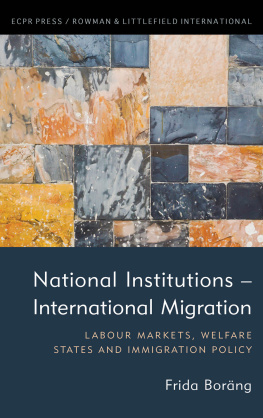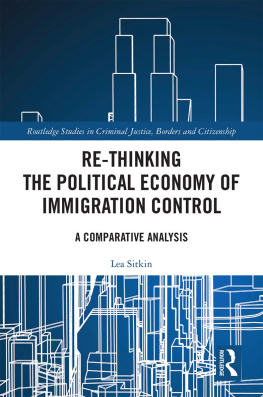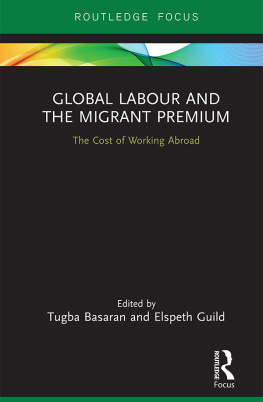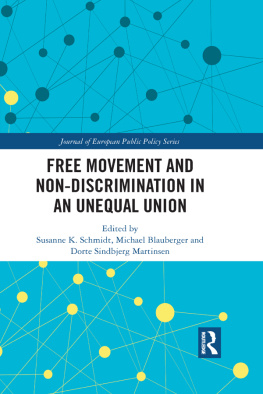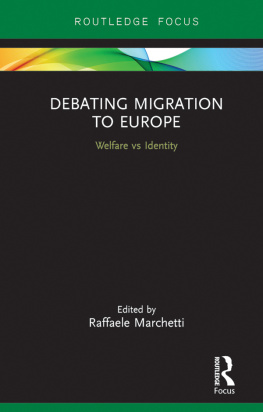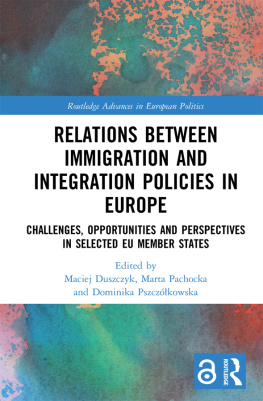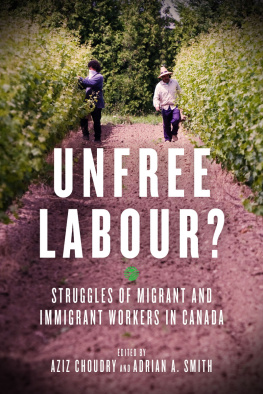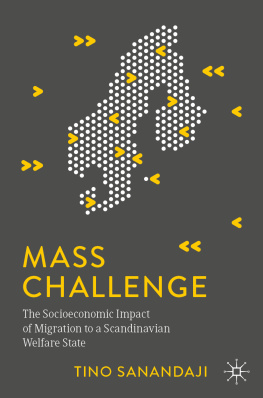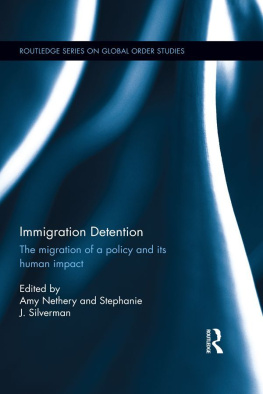National Institutions International Migration
National Institutions International Migration
Labour Markets, Welfare States and Immigration Policy
Frida Borng

London New York
Published by Rowman & Littlefield International Ltd
Unit A, Whitacre Mews, 2634 Stannary Street, London SE11 4AB
www.rowmaninternational.com
In partnership with the European Consortium for Political Research, Harbour House, 68 Hythe Quay, Colchester, CO2 8JF, United Kingdom.
Rowman & Littlefield International Ltd. is an affiliate of Rowman & Littlefield
4501 Forbes Boulevard, Suite 200, Lanham, Maryland 20706, USA
With additional offices in Boulder, New York, Toronto (Canada), and Plymouth (UK)
www.rowman.com
Copyright 2018 by Frida Borng
All rights reserved. No part of this book may be reproduced in any form or by any electronic or mechanical means, including information storage and retrieval systems, without written permission from the publisher, except by a reviewer who may quote passages in a review.
British Library Cataloguing in Publication Data
A catalogue record for this book is available from the British Library
ISBN: HB 978-1-78660-667-9
Library of Congress Cataloging-in-Publication Data
ISBN 978-1-78660-667-9 (cloth)
ISBN 978-1-78660-668-6 (electronic)

The paper used in this publication meets the minimum requirements of American National Standard for Information Sciences Permanence of Paper for Printed Library Materials, ANSI/NISO Z39.481992.
Printed in the United States of America
Contents
Tables and Figures
Tables
Figures
Acknowledgements
Now that I have completed this book project, it is time to express my deep gratitude to the many persons who in various ways have helped me in this undertaking. First and foremost, I want to thank Carl Dahlstrm and Staffan Kumlin. Carl has been involved in this project from the outset and deeply involved at that: always generously offering his time for discussing the project. I am so grateful for all the effort Carl has put into this project over the years and for his support and excellent advice on all aspects of it. I am also very grateful to Staffan, for all his support and excellent advice and for a never-failing enthusiasm for my work which helped me many times.
Many people have given invaluable comments on parts of the book or have in other ways given their support. I am particularly indebted to Klas Andersson, Rasmus Broms, Gregg Bucken-Knapp, Sofie Cedstrand, Nicholas Charron, Agnes Cornell, Gran Duus-Otterstrm, Anders Fredriksson, Thomas Gelotte, Marcia Grimes, Jonas Hinnfors, Sverker Jagers, Maria Jarl, Andrej Kokkonen, Catharina Lindstedt, Daniel Naurin, Marco Nilsson, Jon Pierre, Christina Ribbhagen, Bo Rothstein, Bjrn Rnnerstrand, Isabell Schierenbeck and Maria Solevid. Anna Persson has given invaluable comments on the entire manuscript and also in many other ways given her support. Thank you! I also want to thank Andrew Geddes for inviting me to spend a semester at the Department of Politics at the University of Sheffield and for offering great advice and much appreciated encouragement.
Some of the ideas presented in this book have previously been presented in Borng, Frida (2015) Large-scale solidarity? Effects of welfare state institutions on the admission of forced migrants, European Journal of Political Research 54: 21631 (Wiley). I am grateful to the publisher for giving permission to publish a revised version in this book.
Finally, I want to thank my family and my friends for their love and support.
Chapter 1
Introduction
All advanced capitalist countries admit entry to some immigrants but refuse entry to others. Policies and practices range from active invitation or legal admission to mere tolerance or outright rejection of the people who wish to enter these countries. The reasons for individuals to seek entry also vary from the need to find a safe haven to the wish to reunite with ones family or to work in order to create a better future. Despite the fact that all advanced capitalist countries accept some, but not all, potential immigrants, the variation when it comes to the admission of foreigners or immigration policy is considerable.1 Not only does the overall scale of immigration vary considerably, but states also differ in the relative importance attached to the previously mentioned reasons for migration. Some states accept large numbers of labour migrants but small numbers of refugees, whereas the opposite is true for others. Moreover, immigration policies and patterns show variation over time.
The aim of this book is to shed light on this variation by developing and testing a novel explanation for immigration admission. It is argued that institutions in the areas of labour market policy and welfare policy can shape immigration policy to an important extent. The leaning of labour markets and welfare states towards the more inclusive or the more exclusive can be reflected in policies towards labour immigrants and forced immigrants, respectively, pushing them towards the more inclusive or the more exclusive. Apart from developing this argument theoretically, the book offers a rich empirical analysis of the connection between national institutions and international migration, using a variety of data and methods. Together these analyses provide support for the theoretical argument: this book shows that during the time period studied, immigration policy did not stand independent from labour market and welfare state institutions.
A central point of departure for this study is that in order to understand variation in immigration patterns, we need to pay attention to, and develop different explanations for, different types of immigration. Consequently, although at the most general level the institutional explanation contains one argument that national institutions have an impact on the admission of international migrants at a more specific level, two arguments are presented. These two arguments focus to different degrees on institutions roles in providing incentives and in building norms and they apply to two different sorts of migration: labour immigration and forced immigration.
Building on a comprehensive literature of labour markets and immigration, it is first suggested that institutional arrangements in the area of labour market policy will influence the relative importance of labour immigration to a country. Whereas economic theory suggests a general need for foreign labour in any advanced capitalist state, this institutional argument suggests that the perceived need for foreign labour will depend on the institutional setting: labour immigration will be more important in economies with liberal labour market institutions than in more regulated labour markets. More specifically, it is suggested that decentralised bargaining, a weak position for unions and a lack of active labour market policies are likely to lead to higher levels of labour immigration. The suggested mechanisms behind this effect are that labour market institutions can lessen the demand for, and provide alternatives to, foreign labour and that they can provide advocates for and opponents to labour immigration with different chances of success.
Whereas this institutional (labour market) argument focuses on the role of institutions in promoting a specific incentive structure to which actors adjust, the second argument instead relies heavily on the norm-building aspects of institutions. Drawing on theories from the comparative welfare state literature, it is suggested that comprehensive welfare state institutions will have a positive effect on the admission of forced migrants that is, refugees and asylum seekers. There are three features of comprehensive welfare state institutions that could steer policies towards forced migrants in a more open direction. First, these institutions have been shown to impact on the boundaries of social solidarity. Second, they enhance generalised trust. And third, they can impact on the citizens view of what the state should and can do in terms of protecting individuals. It is argued that under the right circumstances such norms and expectations stemming from welfare state institutions can influence policies towards refugees and asylum seekers.

 The paper used in this publication meets the minimum requirements of American National Standard for Information Sciences Permanence of Paper for Printed Library Materials, ANSI/NISO Z39.481992.
The paper used in this publication meets the minimum requirements of American National Standard for Information Sciences Permanence of Paper for Printed Library Materials, ANSI/NISO Z39.481992.
